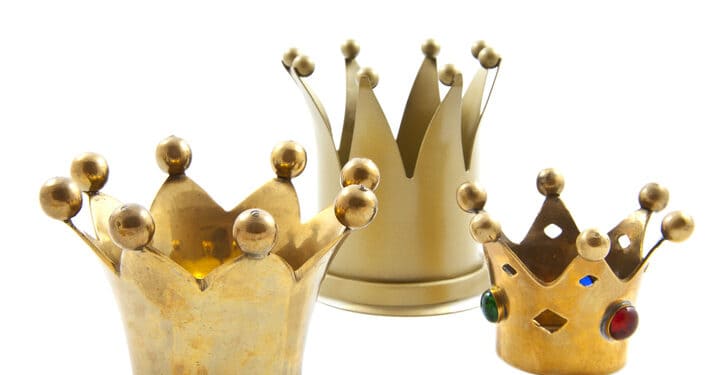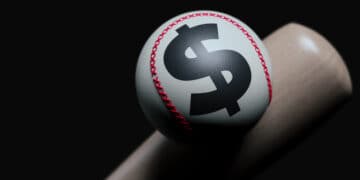- What Makes a Dividend Aristocrat?
- Three Newly Crowned Aristocrats
- J.M. Smucker (NYSE: SJM)
- C.H. Robinson (NASDAQ: CHRW)
- Nordson Corp. (NASDAQ: NDSN)
I’m not shy about my noble history…
James Clifford Mengel II does have a regal ring to it. It so happens that I come from a long line of investing royalty and have been blessed by my forebears who passed down the crown of… dividend investing. With this royal secret, our family’s wealth has compounded over the ages and I, therefore, feel it to be my paternal duty to pass along this knowledge to my descendants.
And my readers, of course…
Since my father first told me about dividends as an eager young lad, I have been obsessed. The fact that you could buy a stock that paid you several times a year regardless of how the share price was doing was revelatory. Why would you buy any stock that doesn’t pay you for owning it?
It seemed like a no-brainer.
Of course, I grew up and realized why some companies couldn’t or shouldn’t pay dividends. Yet my core investment philosophy remained the same: buy dividend stocks, reinvest those dividends, and let them compound those riches over decades.
It was a simple but effective strategy. But it wasn’t until I discovered the royal family of dividend stocks that I truly knew the secret to a lifetime of wealth and prosperity. These stocks made my strategy even more foolproof.
I’m speaking of the fabled “dividend aristocrats,” the most steady and solid of all dividend stocks.
What Makes a Dividend Aristocrat?
Dividend aristocrats are any stocks that have raised their dividends every year for the past 25 years. In our portfolio, we have a couple that has done well enough to reward shareholders for the better part of a century.
To qualify, the company must also be a member of the S&P 500, have a market cap of at least $3 billion, and average at least $5 million in daily share trading value for the preceding three months.
The dividend aristocrat program is designed for all types of markets — bull or bear — to help serious investors reach their goals quickly. Since 1990, the S&P 500 Dividend Aristocrats Index has outperformed the S&P 500 70.59% of the time in down months and 44.10% in up months. Those results don’t come at the expense of lower yield either – aristocrats have averaged 2.5% to the S&P 500’s 1.8%.
You can see exactly how well they’ve done in this chart from Dividend Growth Investor.
Despite the economic headwinds of the past year, the list of aristocrats has actually grown this year.
Three Newly Crowned Aristocrats
Every year, the dividend aristocrats list changes: some companies drop or decrease a dividend, but a few others finally reach the peak of 25 years of increases.
(You can find the entire list of 2023 dividend aristocrats here)
Dividend yields for aristocrats run the gamut from 6.8% for oil-and-gas midstream company Enbridge (NYSE: ENB) to 0.61% for Roper Technologies (NYSE: ROP). But no matter the yield, the key takeaway is that the company is solvent enough to continue raising those payouts. Historically, once a company reaches such an exalted title, it does everything it can to keep it. Otherwise, they have to start all over again.
That is why companies are added and removed every January based on the above requirements. In 2023 we didn’t lose any of them, but we did anoint three brand-new ones, bringing the total to 67.
The companies added were a diverse group: one industrial company, one transportation company, and one consumer goods company. Let’s break them down by dividend yield, from highest to lowest.
J.M. Smucker (NYSE: SJM)
The kid in all of us knows J.M. Smucker from their PB and J holdings: Jif peanut butter and Smucker’s jellies and jams. The company also boasts such coffee brands as Folgers, Dunkin', and Café Bustelo.
All told, the company operates in three segments: consumer foods, pet foods, and coffee.
The pet food segment holds Kibbles ‘n Bits, Meow Mix and Milk-Bone.
All of these are iconic brands that have been around for decades and have landed J.M. Smucker onto the Fortune 500, with an estimated 2022 market value of $14.6 billion. The company was able to withstand inflationary pressures by raising the prices of its brands, most of which are staples in everyone’s pantry and some of the last products consumers decide not to buy.
That is to say, when times are tight, we’re still buying peanut butter, coffee, and dog food. For example, coffee sales rose 10%, and pet food sales rose 14%.
Overall, the company posted $2.2 billion in sales last quarter, up 8% from the year prior. Over the last three years, J.M. Smucker posted an annualized total return (including dividends) of 15% and an 8.4% return over the past year. The S&P dropped 7.4% during that time frame.
The resilience during the inflationary pandemic environment allowed SJM to increase guidance for this year, with a prediction for net sales to increase 5.5 – 6.5%, which is a full percentage point higher than initial estimates.
SJM has been even more impressive over the past six months:
They landed on 2023’s dividend aristocrat list because they just approved a $1.02 per share dividend on common shares. SJM now yields 2.76%.
J.M Smuckers is an excellent buy-and-hold stock that will slowly build over the long term. Just make sure to reinvest those dividends.
C.H. Robinson Worldwide (NASDAQ: CHRW)
In the early 1900s, Charles Henry Robinson owned a wholesale brokerage house that provided produce in North Dakota and Minnesota. It grew from there, and now C.H. Robinson provides freight transportation, management, brokerage, and warehousing worldwide. It currently has 100,000 customers, $28 billion under freight management, and delivers 20 million shipments per year.
They also have Robinson Fresh, a brand that buys, sells, and markets fresh produce and products.
CHRW has continued to automate its business and now boasts 658,000 fully automated bookings with carriers in their truckload business, which is an 87% increase compared to Q3 of 2021. Loads booked digitally by carriers increased 144% from January to September 2022, marking a 173% increase year-over-year.
They get $1.2 billion of revenue through this growing digital channel.
While it hasn’t seen tremendous returns over the past year, it’s certainly kept pace with the broader market:
CHRW also delivers reliable increases to its dividend each and every year, which is why they were crowned as a dividend aristocrat for the first time this year. They currently yield 2.5%.
However, as you can see in the chart above, the stock dropped significantly after UBS cut its rating to Sell from Neutral. UBS analyst Thomas Wadewitz wrote that he sees a sharper drop in revenue and earnings per share due to “dramatically lower ocean shipping rates and a drop in truckload contract rates.”
Waadewitz cut his price target to $81. CHRW currently trades around $98, representing a significant drop.
The company has already started cost-cutting measures to combat those trends, the most recent of which was the layoff of 650 employees in November. If there is any silver lining in mass layoffs, some sources had estimated somewhere in the realm of 1,000 to 1,200 employees getting the boot.
Long-term C.H. Robinson should be able to right the ship, but I’d wait until a dip closer to $80 before wading into those waters.
Nordson Corp. (NASDAQ: NDSN)
Nordson boosts the industrial sector's representation in the dividend aristocrats.
The company designs and manufactures systems that dispense, apply and control fluids like adhesives, coatings, and sealants. Nordson's biggest customers, such as aerospace, biotechnology, food packaging, and semiconductor manufacturing, are rather diverse.
The company is split into three segments: Advanced Technology Solutions (51% of revenue), Medical and Fluid Solutions (27% of revenue), and Industrial Precision Solutions (22% of revenue).
In essence, Nordson produces machines and parts for the last stages of various industrial manufacturing processes, including packaging, testing, and inspection.
You can see the diversification here:
Nordson has 7,330 employees in over 35 countries and pulled in $2.6 billion in sales last year.
In the last quarter, Nordson reported some solid results for 2022:
Fourth Quarter:
- Sales were $684 million, a 14% year-over-year increase, 18% were organic.
- Operating profit was $178 million, a 17% increase over the prior year.
- Earnings were $2.44 per diluted share, a 30% increase from the prior year's earnings per share.
Full Year:
- Full-year sales, operating profit, and earnings per share were all company records.
- Sales were $2.6 billion, a 10% year-over-year increase.
- Earnings were $8.81 per diluted share; adjusted earnings were $9.43 per diluted share, a 22% increase from the prior year adjusted earnings per share.
Not too shabby.
The company also has quietly put together quite a return over the past three years:
It's not a triple-digit juggernaut, but a solid performance nonetheless. Nordson is up about 6% in the past year during the overall market tumult.
The S&P says the company has hiked its payout for 42 consecutive years, but by Nordson's count, it's raised the dividend for 59 straight years. So they technically would be a dividend king by their own measures. That would place the company in an elite group of 14 U.S. publicly traded companies to have raised their dividend for that many years.
However, that dividend is a mere 1.1%.
Personally, I like a little bit more bang for my buck with dividend aristocrats.
I don’t love ‘em, but I don’t hate ‘em. It’s a bland company that knows what it’s doing and should keep chugging along for the years to come.
Welcome to the Club
There you have it, three newly crowned dividend aristocrats. C.H. Robinson Worldwide, Nordson Corp., and J.M. Smucker — welcome to the club. You are in good company.
You can view all of 2023’s dividend aristocrats right here.
If you would like to get exposure to all of the dividend aristocrats, I’d urge you to take a look at
ProShares S&P 500 Aristocrats ETF (BATS: NOBL).
This ETF provides exposure to 50 companies that raised dividend payments annually for at least 25 years by tracking the S&P 500 Dividend Aristocrats. The index contains a minimum of 40 stocks, which are pretty equally weighted.
Godspeed,
Jimmy Mengel
Follow me on Twitter @mengeled.













